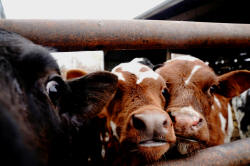Drug, feed ingredient shortages hit U.S. livestock producers
 Send a link to a friend
Send a link to a friend
 [November 18, 2021] By
P.J. Huffstutter and Tom Polansek [November 18, 2021] By
P.J. Huffstutter and Tom Polansek
CHICAGO (Reuters) - Michigan dairy farmer
Doug Chapin has been unable to buy bottles of veterinary penicillin for
his cows for more than a month.
In Minnesota, pig farmer Randy Spronk reformulated feed rations due to a
shortage of the widely used ingredient lysine, an amino acid that helps
livestock grow.
Supply-chain disruptions are hitting America's meat producers and
sending them scrambling for alternatives as they seek to care for farm
animals and keep down costs.
Shortages of some medications like penicillin reflect in part a
competition for raw materials between people and animals, as the
COVID-19 pandemic shifts demand and disrupts global trade through
shipping logjams and port bottlenecks.
Supply issues, in turn, have veterinarians questioning long-standing
farm practices and are forcing changes within the food sector. WH
Group's Smithfield Foods, the world's biggest pork producer, told
Reuters it has seen shortages and substituted products and manufacturers
when necessary to maintain animal care.
In farm states including Iowa and Minnesota, farmers said they are
struggling to find lysine, typically a cheaper feed alternative to
soybean meal.

The main supply issues surround dry lysine products out of China, said
Archer-Daniels-Midland. The Chicago-based commodity trader ended dry
lysine production this year and sells a liquid version.
Farmers like Spronk are feeding more soybean meal to pigs at a higher
cost to replace dry lysine. The shift helped lift Chicago Board of Trade
soymeal futures to a four-month high on Wednesday.
"It's to the point where literally producers are having to reformulate
to pull lysine out or lower the lysine level to try to extend it,"
Spronk said. "You can't get it."
SCRAMBLE FOR SUPPLIES
For medications, Chapin and his family are trying to stock up on
penicillin and other products in case animals fall ill. One of the most
commonly used drugs in livestock production, penicillin can treat
respiratory diseases and other conditions.
"I always figured the next bottle is just a phone call away," Chapin
said.
Widespread penicillin shortages across the country have caused
challenges for cattle and dairy operations, said Patrick Gorden,
president of the American Association of Bovine Practitioners.
Veterinarians have struggled to find even a few bottles of Pen-G, an
injectable antibiotic for treating ill cattle, sheep and swine.

[to top of second column] |

Dairy cows are seen on Derrydale Farm, an organic dairy farm in
Belle Plaine, Minnesota, U.S., October 24, 2020. Picture taken
October 24, 2020. REUTERS/Bing Guan/File Photo

Similar shortages are emerging for some tetracyclines, a class of antibiotic
used to treat bacterial infections in farm animals, veterinarians said.
"In some cases, we've looked at alternatives to therapy or had conversations as
to whether this treatment is really all that effective or needed at all," Gorden
said.
The U.S. Food and Drug Administration (FDA) lists shortages of nine veterinarian
drugs that began in the wake of the pandemic. The agency said it contacted
manufacturers and does not know when they will resolve supply issues.
"These shortages should not limit veterinarians' ability to provide appropriate
medical treatment or euthanasia to pets or livestock," said Jose Arce, president
of the American Veterinary Medical Association.
But the food and pharmaceutical sectors are feeling an impact.
The world's largest animal-health company, Zoetis Inc, does not manufacture
penicillin products but reported "localized constraints" on other products as
the pandemic has impacted supply chains. The company declined to name these
medications.
Ireland-based manufacturer Bimeda Inc has two veterinary penicillin products on
FDA's drug-shortage list, including Pro-Pen-G.
North American and Chinese suppliers of an FDA-approved material used to
manufacture penicillin suffered supply outages early this year, Bimeda
spokeswoman Mary van Dijk said. She declined to name the material. A Chinese
supplier also experienced quality issues that took about six months to resolve,
she said.

Another problem is raw materials normally used to make antibiotics for animals
have been diverted to manufacture amoxicillin for humans, van Dijk said. The
drugs share common starting materials, and demand for human amoxicillin rose
during the pandemic, she said.
Amoxicillin can be used to treat ear infections in children, sore throats and
other conditions.
"The supply disruptions are not entirely solved," van Dijk said.
(Reporting By P.J. Huffstutter and Tom Polansek in Chicago; Editing by Caroline
Stauffer and Marguerita Choy)
[© 2021 Thomson Reuters. All rights
reserved.] Copyright 2021 Reuters. All rights reserved. This material may not be published,
broadcast, rewritten or redistributed.
Thompson Reuters is solely responsible for this content. |